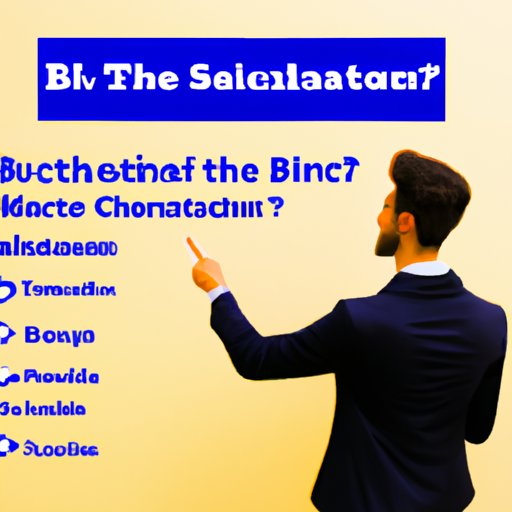Introduction
A Bachelor of Science (B.S.) degree is an undergraduate degree that requires students to complete a curriculum focused on a specific field of study. It typically takes four years to earn a B.S. degree, depending on the major chosen and the school attended. Earning a B.S. degree can open up many doors in terms of career opportunities and higher salaries. In this article, we will explore the benefits and requirements of earning a B.S. degree, as well as provide some tips for choosing the right program for you.
What Can You Do with a Bachelor of Science Degree?
A B.S. degree can prepare students for a wide range of careers, from engineering and computer science to nursing and business. According to the Bureau of Labor Statistics, those with a B.S. degree have an average earnings of $68,000 per year, compared to $41,500 for those with only a high school diploma. Additionally, those with a B.S. degree are much more likely to get a job than those without one.
Examples of specific jobs and industries that benefit from having a B.S. degree include software engineers, web developers, nurses, and financial analysts. Those with a B.S. in engineering can pursue careers in civil, mechanical, electrical, or aerospace engineering. Those with a B.S. in computer science can find jobs as software developers or system administrators. Those with a B.S. in business can go into marketing, accounting, or finance. And those with a B.S. in nursing can work as registered nurses or nurse practitioners.

An Overview of the Requirements for a Bachelor of Science Degree
In general, most B.S. degrees require students to complete 120 credits, which typically equates to four years of full-time study. However, the exact requirements can vary depending on the school and the program. Students must also maintain a minimum GPA in order to graduate. Most schools require a minimum GPA of 2.0, although some may require a higher GPA.
In addition to completing the required coursework, students may need to complete additional requirements such as internships or research projects. Some programs may also require students to take part in extracurricular activities or community service. Each program will have its own specific requirements, so it’s important to research each program carefully before applying.
A Comparison of Different Types of Bachelor of Science Degrees
There are several different types of B.S. degrees available, including traditional B.S. degrees, accelerated B.S. degrees, and online B.S. degrees. Traditional B.S. degrees typically take four years to complete and involve taking courses in person at a college or university. Accelerated B.S. degrees allow students to complete their degree in a shorter amount of time, usually two to three years. Online B.S. degrees are offered through online universities and allow students to complete their degree entirely online.
The advantages of each type of B.S. degree depend on the individual student. For example, traditional B.S. degrees offer the opportunity to attend classes in person and interact with other students and faculty. Accelerated B.S. degrees offer the advantage of being able to complete the degree in a shorter amount of time. And online B.S. degrees offer the convenience of being able to complete the degree from anywhere in the world.

The Career Opportunities Available with a Bachelor of Science Degree
Having a B.S. degree can open up many doors in terms of career opportunities. According to the U.S. Bureau of Labor Statistics, those with a B.S. degree have an average earnings of $68,000 per year, compared to $41,500 for those with only a high school diploma. Additionally, those with a B.S. degree are much more likely to get a job than those without one.
Examples of specific jobs and industries that are hiring those with a B.S. degree include software engineers, web developers, nurses, and financial analysts. The job market for these positions is expected to grow significantly over the next few years, making it a great time to earn a B.S. degree.

A Guide to Choosing the Right Bachelor of Science Program for You
Choosing the right B.S. program for you is an important decision. There are several factors to consider when researching and selecting a B.S. program, such as the cost of tuition, the length of the program, and the quality of the faculty. It’s also important to consider the job prospects after graduation. Researching the job market and salary potential for graduates of each program can help you make an informed decision.
When deciding which B.S. program is best for you, it’s important to ask yourself questions such as: How long will it take me to complete the program? What type of job will I be qualified for after graduating? Are there any special requirements or prerequisites for the program? Answering these questions can help you narrow down your choices and select the best program for you.
Conclusion
Earning a Bachelor of Science (B.S.) degree can open up many doors in terms of career opportunities and higher salaries. It’s important to understand the benefits and requirements of earning a B.S. degree, as well as the different types of B.S. degrees available, so you can make an informed decision about which program is best for you. With the right program, a B.S. degree can help you reach your career goals and achieve success.
(Note: Is this article not meeting your expectations? Do you have knowledge or insights to share? Unlock new opportunities and expand your reach by joining our authors team. Click Registration to join us and share your expertise with our readers.)
